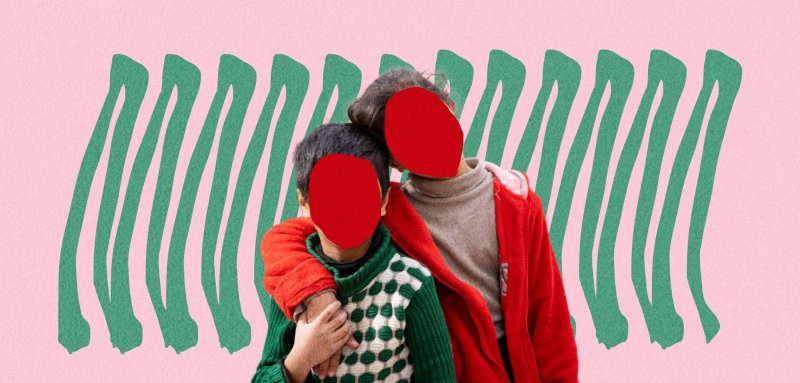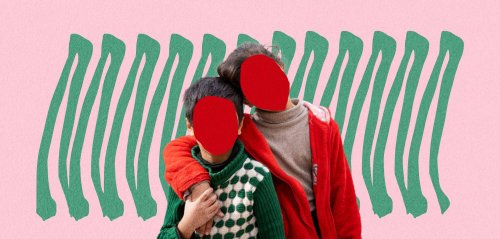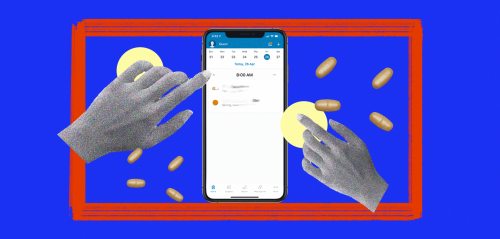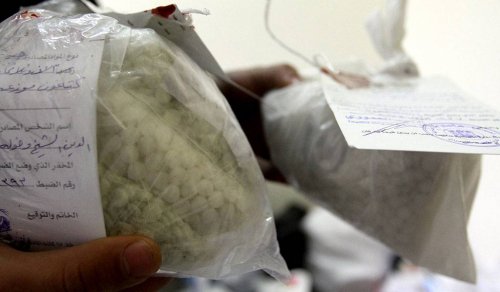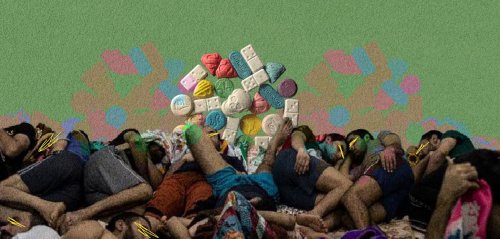Eight months have passed since the new Children Rights Law came into force, but this period was not long enough for the Jordanian Ministry of Health to fulfil its responsibilities stipulated by that law to establish a specialized centre for treating children suffering from drug addiction. The law, effective from early 2023, clearly defined the responsibility of the Ministry of Health in upholding the law, when previously this was divided among various entities. Nonetheless, the Ministry of Health did not allocate funds towards building the rehabilitation centre in its 2023 budget. Therefore, the issue of treating and rehabilitating children away from the clutches of addiction persists amidst continued delays.
While the centre remains a mere text in a law awaiting implementation, seventeen-year-old Omar finds himself in the clutches of addiction that has haunted him since attending his seventh grade at a new school in the east of the capital, Amman.
Omar explains his journey with addiction, which transformed him from a dreaming young person to a “juvenile” entangled in legal troubles. “Just once they let me try it, so I could prove to them that I am a man. I took a puff, and it almost made me cough my lungs out, but then I started to like it. I began smoking the cannabis they gave me, in return for running their errands.”
When he first moved to his new school Omar explains that “all the boys grew taller than me and their voices were louder and thicker, and they did not see me; it was as though I did not exist. This provoked me and made me feel that I was not as good as they were. I got closer to them, befriended them and imitated everything they did. One day I begged them to let me try their cannabis cigarettes.”
Omar says that after smoking for the first time, “They started laughing at me and telling me I was just a boy, and this is a high impact 'stuff': You can't handle it, and you don't even have the money to afford it.”
Omar neglected school and was drawn to dealing drugs in order to secure his supplies. He was arrested for drug use and drug dealing the first time when he was in the ninth grade.
Omar says, “I went to a rehabilitation centre for three months, and then I left and went back to my friends who taught me how to do drugs. I started selling them to have pocket money and to secure my own supplies. My addiction developed from hashish to “Joker” drugs, then heroin, and then I stopped going back home.”
Omar was arrested again and was placed in a juvenile facility. He says, “I was caught again and went to a juvenile facility for six months. Just like the first time, I did not receive treatment or anything.”
When he was released, he went back to the drug market and “delved deeper into all forms of drug abuse.”
Omar’s is one of 73 cases documented by this investigation and is included in 66 judicial decisions on cases of children's drug addiction transferred to juvenile homes affiliated with the Ministry of Social Development without receiving treatment in government medical centres designated for this category. Although the Jordanian Juvenile Law stipulates the need to rehabilitate and treat juveniles, such centres do not exist in the first place, and private centres are too costly.
Official statistics are not available
Between 2017 and 2021, the juvenile education and rehabilitation homes affiliated with the Ministry of Social Development received around 11, 300 juveniles.
When asked about the number of addicts among those placed in its centres, the spokesman of the Ministry of Social Development, Ashraf Khreis, replied, “We don’t have an exact number, as the cases are hard to narrow down given the lack of a specialized centre to treat them.”
In an attempt to determine the gravity of the phenomenon of addiction among children, we went through the search engine Qistas for judicial decisions issued by the State Security Court – the only court authorized to hear drug-related cases in Jordan – for this period.
Although the law became effective in early 2023, the Ministry of Health hasn't allocated any funds in its budget for the centre's construction, leaving the issue of treating and rehabilitating addicted children in a state of limbo, stuck in a cycle of delays
We found that the court convicted 73 juveniles in 66 cases in one or more drug-related crimes, such as drug abuse, possession, trafficking, and dealing. The offenders were between fourteen and eighteen years old at the time of committing their crimes.
Court decisions showed that the seventeen-year-old age group committed these crimes the most, with 42 out of 73 cases.
Data also showed that in 97% of the cases, offenders were placed in juvenile homes and that the remaining percentage was subject to imprisonment after they reached the legal age of eighteen.
Treatment and rehabilitation: Only available in theory
The rights of Omar and his fellow victims to treatment and rehabilitation has been lost due to the unenforced legal provisions. The Juvenile Law of 2014 stipulates that “The best interest of the juvenile, his protection, reform, rehabilitation and care shall be taken into account.” However, this is not achieved in practice as juveniles are merely transferred to the National Centre for the Treatment of Addiction (affiliated with the Ministry of Health) designated to treat adults, where they go to get prescribed medication, prior to going back to the centre without undergoing any rehabilitation.
Ashraf Khreis, the spokesperson for the Ministry of Social Development says, “Upon arrival, a juvenile drug user is provided with basic services, such as shelter, food, water and clothing.”
After that, the care home nurse conducts an initial medical examination to evaluate the juvenile’s condition. If it turns out that the person suffers from addiction, he is transferred to the National Centre for the Treatment of Addiction without being admitted for treatment at that centre. According to Khreis, juveniles accused of drug abuse cases have separate dormitories only from other residents at the care homes.
According to human rights lawyer Taghrid Al-Doghmi, the “best interest” stipulated by the law requires that juveniles be transferred to a specialized centre for treating addiction among children, and not a centre for adults. Al-Doghmi holds the Ministry of Social Development responsible for the loss of the right to reform, rehabilitate and care; she says, “Rehabilitation cannot be achieved before treatment.”
Moreover, juvenile care and rehabilitation homes have weak psychological and counseling services due to the small number of psychological and social specialists compared to the number of detained and sentenced juveniles. In its latest annual report for 2021, the National Centre for Human Rights (an official entity) recommended raising the capabilities of workers in the sector of juvenile justice, increasing specialized training since most shelters do not adhere to the principle of separation based on age group; separation is only done on the basis of the sentence and detention categorization.
The National Centre for Rehabilitating Addicts.. for adults only
Psychiatrist and addiction treatment specialist Walid Sarhan explains that simply referring juvenile addicts to the National Centre for Rehabilitating Addicts is not effective because it has no department dedicated to children. Sarhan believes that treating children who are addicts is “difficult” because the national centre does not provide them with the necessary health care provisions, while treatment in private centres is costly.
The former head of the National Centre for Rehabilitating Addicts, Mohammad Al-Suhaim, agrees with Sarhan over the need to establish a specialized centre for treating addiction among children. He says that this has not been realized due to the lack of the necessary funds, a point that was also confirmed by Imad Abu Al-Yaqin, the Director of the Administration of Hospitals at the Ministry of Health.
Lawyer Al-Doghmi says that at the end of the day the government bears responsibility for not implementing the laws, since it is the entity in charge of enforcing its provisions. She adds, “The government and the ministers are responsible for implementing all laws when these are issued, which means that the responsibility of establishing a specialized centre for treating addiction among juveniles befalls on the government generally, on the Ministry of Social Development that did not take the best interests of the juvenile into account, and on the Ministry of Health, which did not provide the necessary centres.”
The Ministry of Health contradicts itself
The Ministry of Health confirmed that “establishing a centre dedicated to treating addiction among children is in step with regulations and laws. The project has been approved by the Minister of Health, and several entities to supervise the project would be determined later.” However, the ministry did not set a date for the start of the project, nor did it allocate the necessary funds in its 2023 budget.
In its email response, the Ministry of Health merely said that it had approved the project and would determine the implementation steps later. The response concluded with, “There are no obstacles facing the project, and things are going well.”
Conflict with international agreements
Jordan’s failure to treat and rehabilitate addiction among juveniles contradicts with the international agreements to which the Kingdom had acceded. These include the Convention on the Rights of the Child, signed about three decades ago, and the International Covenant on Civil and Political Rights, which specializes in fair trial guarantees and was signed 47 years ago.
Muaz Al-Momani is the head of the Lawyers Without Borders organization and specializes in human rights issues. He believes that the lack of a specialized centre for treating addiction among juveniles means that some institutions, including the Ministry of Health, are not fulfilling their duties towards them. Al-Momani adds, “The relevant international agreements barely discuss separating juveniles from others within correctional and rehabilitation centres , let alone provide addiction treatment.”
Al-Momani explains that Articles (10) and (14) of the International Covenant on Civil and Political Rights touch on the necessity of separating juveniles from adults and the accused from the convicted; therefore, according to Al-Momani, treating a juvenile for addiction should be separated from treating an adult.
Jordan’s failure to treat and rehabilitate addiction among juveniles contradicts with the international agreements to which the Kingdom had acceded, including the Convention on the Rights of the Child, and the International Covenant on Civil and Political Rights
Human rights expert Nahla Al-Momani believes that committing to international agreements related to the Convention on the Rights of the Child, requires the concerned authorities to dedicate a clause about spending, with the need to coordinate among the various parties on the ground, and only then “there will be obvious results.” According to Nahla Al-Momani, the continued lack of coordination and the lack of a database for addicted children may lead to an increase in the rates of drug abuse among them.
An opportunity missed
Twenty-seven-year-old Mohammad is unemployed. His journey with addiction began at the age of sixteen, he was first arrested a year after he began his habit. He says, “My father and mother are separated, I am the youngest of my siblings, all of whom got married, and are settled in different parts of the country. At school I was an excellent student, and I memorized the Qur’an, which minimized any suspicions around me, as no one could believe that I was a drug addict.”
Mohammad goes ten years back in time and remembers, “When I used drugs the first time, I was at a party of young men who were distributing cannabis/hashish. I was hesitant and afraid, but the guys said it would give you a nice feeling. I became curious and wanted to try it.”
He continues, “I spent a while using just hashish or what is called 'the green bag'. Then, a new drug called ‘Captagon’ appeared.”
Mohammad was placed in a juvenile home in Juwaidah in Amman twice at the age of sixteen. At that time, he did not receive treatment that could save him from addiction. After the age of twenty, he was treated twice at the National Centre for Rehabilitating Addicts.
Mohammad says, “Maybe if they had treated me when I was sixteen or seventeen years old, getting results might have been easier. At twenty-five years of age, you would go back to the same environment even if you were treated, and the treatment would not be beneficial. If I had been treated when I was young, I would not have used it again.”
The same is true for Omar who says, “If I had been treated at the juvenile detention centre, or if my family had helped me with anything other than beating me up, and expelling me from the house for fear for their reputation in the neighbourhood, I would not have reached this point. There is no turning back for me now, because my system is full of drugs.”
Omar, Mohammad and many other children like them are likely to continue to miss their chances to receive treatment for drug abuse, in the absence of a dedicated centre to try to rescue them at a young age.
This report was completed with the support of Arij
Raseef22 is a not for profit entity. Our focus is on quality journalism. Every contribution to the NasRaseef membership goes directly towards journalism production. We stand independent, not accepting corporate sponsorships, sponsored content or political funding.
Support our mission to keep Raseef22 available to all readers by clicking here!
Interested in writing with us? Check our pitch process here!
